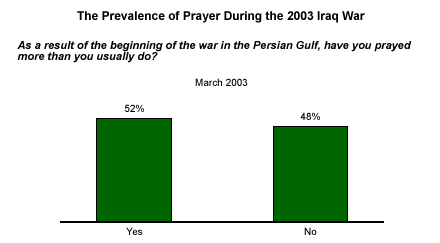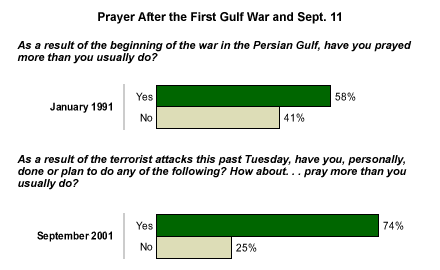Americans have historically turned to and relied on prayer during times of national crisis. This tendency is most recently apparent in findings from a March 2003 Gallup Poll*, which showed 52% of the population reported praying more because of the war with Iraq. Forty-eight percent said they did not change their prayer habits.

Most inclined to have said they prayed more were women (63%), nonwhites (61%), adults aged 65 and older (58%), and those making under $50,000 a year (61%). The findings differ little between Republicans and Democrats. However, there is a slight difference between the percentage of liberals saying they prayed more as a result of the war (39%) and the percentage of conservatives saying the same (54%).
The current percentage of people saying they prayed more because of the war falls well below the percentage recorded in the immediate aftermath of the terrorist attacks on Sept. 11, 2001. At that time, three-fourths (74%) of Americans said they prayed more than usual**. The latest percentage also dips below the percentage of the population who reported in January 1991 that they had been praying more since the beginning of the Persian Gulf War (58%).

Gallup Polling since the 1930s has shown that a consistent 9 in 10 Americans pray at one time or another. This finding, plus findings that indicate sharp increases in the percentage who pray more during a time of national crisis, raises the question: Do people really believe in the efficacy of prayer, or do they turn to prayer simply out of fear or foreboding?
Over recent decades, The Gallup Poll has explored the dimensions of prayer habits and experiences in considerable depth.
What Are the Basic Types of Prayer?
In a study conducted by Gallup in conjunction with the Society of the Scientific Study of Religion and the Religion Research Association in 1988***, four basic types of prayer were identified:
- Eighty-four percent engaged in conversational prayer, in which they talk with God in their own words, thank him for his blessings, ask for forgiveness of sins, and/or ask God for blessings.
- Fifty-two percent practiced meditative prayer by quietly thinking about God, trying to listen to God speak to them, spending time worshiping and adoring God, or just "feeling" the presence of God.
- Petitionary prayer was practiced by 42% of adults, who pray to God to ask him for material things they may need. Included under this heading would be persons who, in times of crisis, urgently seek courage, as well as insight into God's ultimate purposes.
- Nineteen percent of adults practiced ritual prayer, consisting of reading from a book of prayers and reciting memorized prayers.
What Do People Experience When They Pray?
In response to a list of suggested experiences (from the same study), here is what people who pray said happens to them:
- Eighty-eight percent experienced a deep sense of peace and wellbeing. Even in the midst of crises, many people reported feeling comforted and empowered. Some indicated that such crises (in society or in their own personal lives) have led them to experience God's grace in a particularly powerful way.
- Seventy-nine percent felt a strong presence of God.
- Seventy-three percent received what they regarded as a definite answer to a specific prayer or request at least once.
- Sixty-one percent received what they believed to be a deeper insight into a spiritual or biblical truth.
- Fifty-seven percent felt divinely inspired or "led by God" to perform some specific action.
*Findings are based on telephone interviews with a random sample of 1,019 adults, aged 18 and older, conducted March 22-23, 2003. For results based on the total sample of adults, one can say with 95% confidence that the margin of sampling error is ±3 percentage points.
**Findings are based on telephone interviews with a random sample of 1,032 adults, aged 18 and older, conducted Sept. 14-15, 2001. For results based on the total sample of adults, one can say with 95% confidence that the margin of sampling error is ±3 percentage points.
***Findings are based on telephone interviews with a random sample of 1,030 adults, aged 18 and older, conducted in the fall of 1988. For results based on the total sample of adults, one can say with 95% confidence that the margin of sampling error is ±3 percentage points.
